CCLP meets with State Dept., Voice of America, and more in DC to discuss public diplomacy
The USC Annenberg Center on Communication Leadership & Policy (CCLP) partnered with the USC Master’s in Public Diplomacy (MPD) program on a professional development and networking trip in Washington, DC, in March 2016. MPD graduate students Amanda Lester, Jung-hwa “Judy” Kang, and myself, Justin Chapman (I serve as CCLP’s Project Fellow), represented CCLP and the MPD program at events and in high-level meetings with officials from the State Department, Voice of America, Congress, the Kennedy Center, the British Council, the Atlantic Council, the Brookings Institution, USC’s DC office, the United Nations Information Center, the White House, Ford’s Theater, the National Press Club, the Washington Post, Global Ties US, the Korean Embassy, the Kazakhstan Embassy, the National Air and Space Museum, and more.
Having just started the program in January, it was an honor, a privilege, and a responsibility to represent the MPD program in Washington, DC. I stayed with my new brother-in-law Nick Kirkpatrick, the Washington Post’s only foreign section photo editor. He assigns photographers to shoot stories being covered by the Post’s foreign correspondents, and ultimately chooses which photos will accompany those stories on the front page of the paper. Before Lester and Kang arrived in Washington, I went to work with Kirkpatrick, who showed me around the Post‘s newsroom. The Post recently moved offices a couple blocks away from its historic building.
When Lester and Kang arrived, the MPD/CCLP delegation kicked off five days of high-level meetings with a visit to USC’s DC office. We met with Adam Clayton Powell III, Senior Fellow at CCLP, University Fellow at the USC Center on Public Diplomacy, and president of the Public Diplomacy Council.
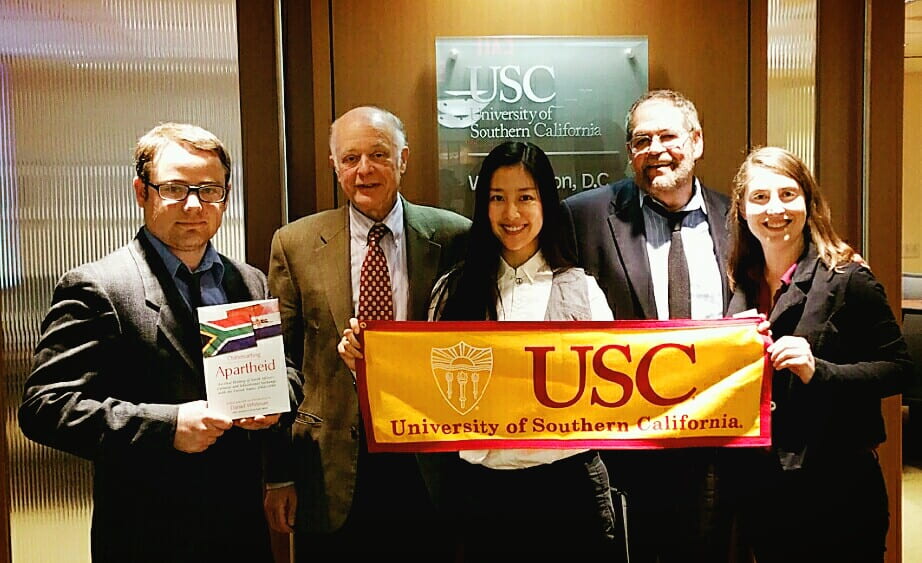
Powell said public diplomacy is growing in popularity, thanks in large part to USC and the Center on Public Diplomacy (CPD).
“Everybody says the USC CPD website is the gold standard globally for public diplomacy,” Powell said. “These are people who teach at other major universities and use the website shamelessly. People come from around the U.S. and abroad to see what resources there are. It’s interesting to see how PD and the study of it is viewed with such interest.”
Last year Google approached Powell and CCLP and asked them to study the Internet of Things (IOT).
“Ten to twenty years from now there could be billions of things connected to the internet,” said Powell. “Vint Cerf [father of the Internet] likes to say that all kitchen appliances will be connected to Internet and you will be able to run them by your cell phone. Things can go wrong, and spectacularly. You can imagine if someone’s hacking into an airplane, or stopping all cars in the city; it’s not beyond the realm of possibility. Google wants us to acquaint policymakers here in Washington, the federal government, international agencies, NGOs, etc., with how they should be thinking about connecting and responding to these kinds of problems, be it a bad actor like North Korea or a ten year old in her pajamas who accidentally launches some code. Pieces of software could interact in ways not predicated and create havoc. How should governments be thinking about this? Google says it’s an international problem.”
After offering even more cogent insights into the changing media and technology landscapes, Powell introduced a special guest – who had in fact brought his own special guest.
Daniel Whitman, former Program Officer at the U.S. Embassy in Pretoria, brought his new book Outsmarting Apartheid: An Oral History of South Africa’s Cultural and Educational Exchange with the United States, 1960-1999, a wealth of stories from his career in public diplomacy, and a friend and colleague, Dr. Abdin Noboa-Rios. A native of Puerto Rico, Dr. Noboa-Rios is writing a book on the growing Latino education crisis in America. Discussion topics included: the distinction between public diplomacy and development; lessons from Mr. Whitman’s experiences in post-apartheid South Africa; arguments for continued funding of international exchange programs; transferring lessons from the international to the domestic sphere; and ideas for future research.
“Culture is politics,” said Whitman. “We understood that for a brief time but then we lost sight of it. It’s during the relaxation of tensions that you need to increase outreach to other cultures, not decrease.”
Whitman pointed out that there is a thin line between legitimate public diplomacy and propaganda.
“In public diplomacy, we converse, we share ideas, and we listen,” he said. “We do not ‘assist’ other countries. To the exten that PD has turned into a megaphone for social messaging to convince people that ‘we’re not bad;’ that is a failure. If there’s any element of ‘we will show you something; we’re not bad,’ it absolutely crosses the line into propaganda. As soon as you’re doing one way communication, even if you’re telling the truth 100%, you’re not furthering any goal, and the audience will not trust you.”
Later that afternoon, the MPD/CCLP delegation visited Voice of America (VOA), the U.S. Government’s broadcast institution whose programming is directed at foreign audiences, especially in places where U.S. news is otherwise not readily available. USC Annenberg has a special connection to VOA: CCLP director and former Annenberg Dean Geoffrey Cowan served as the 22nd Director of VOA from 1994-1996, and Professor Cowan’s father Louis served as the 2nd Director of VOA from 1943-1945.

During the visit to VOA, the MPD/CCLP delegation was privileged to meet with the institution’s Acting Director, Kelu Chao, who talked to us about how VOA is adapting to the changing media environment, maintaining its objectivity while still serving as a diplomatic tool, and working to engage its audiences by generating in-depth discussions.
“As a news person, I know objectivity is in the eye of the beholder,” said Chao. “It would be very difficult when someone writes a story to not be influenced by their background. It’s part of the challenge. But for a trained journalist, credibility is everything. And our audience knows; they can smell propaganda right away, because they’re subjected to propaganda all the time [in their home countries]. We’re very sensitive about this. We really look at ourselves and every story hopefully is balanced.”
The MPD/CCLP delegation began day two by visiting the Brookings Institution, a non-profit, nonpartisan think tank celebrating its centenary.
Ryan McElveen, assistant director of the Brookings Institution’s John L. Thornton China Center, gave us an overview of both the Institution and its China Center, which is among the most respected in the world. Asked about whether the relationship between the U.S. and China will remain amicable or will eventually result in conflict, McElveen said, “Brookings is optimistic about our relations…. I do believe China will continue to be a partner on major issues, such as climate change.”
Following a tour of the Brookings Institution’s facilities, the MPD/CCLP delegation sat in on a well attended forum with keynote speaker Filippo Grandi, the newly appointed United Nations High Commissioner on Refugees (UNHCR).
“On the 5th anniversary of the crisis in Syria, we should reflect on the collective abysmal political failure that Syria represents for the international community,” said Grandi. “The human cost of this failure is quickly becoming incalculable. Never forget, behind all those numbers are individuals experiencing unthinkable suffering.”

From the Brookings Institution, the MPD/CCLP delegation traveled to Capitol Hill, where we were led on a tour of the Capitol building by the staff of Congressman Adam Schiff (D-28th District, CA). President Barack Obama happened to be hosting a St. Patrick’s Day luncheon with House Speaker Paul Ryan at the Capitol during the MPD delegation’s tour.

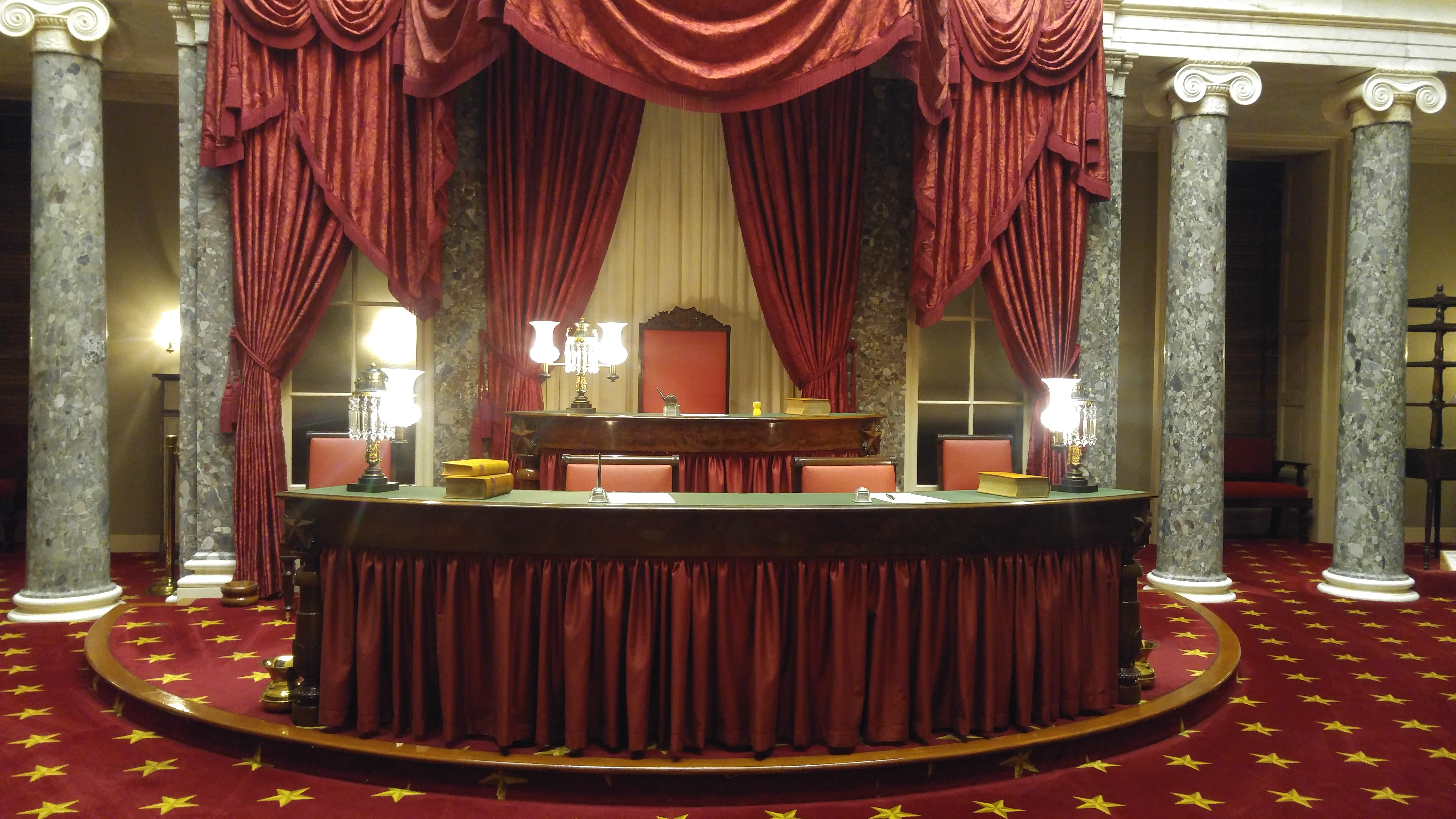
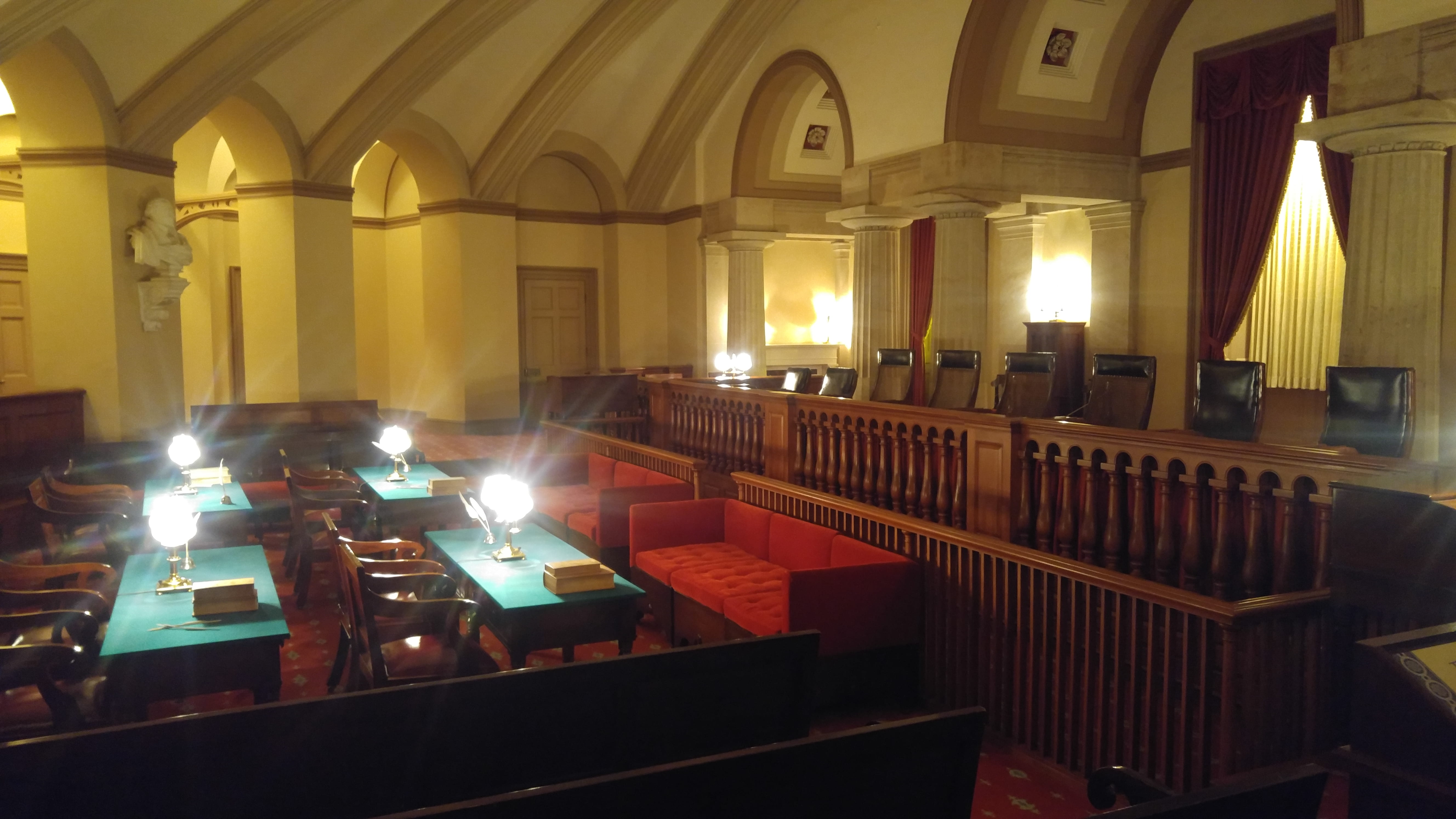
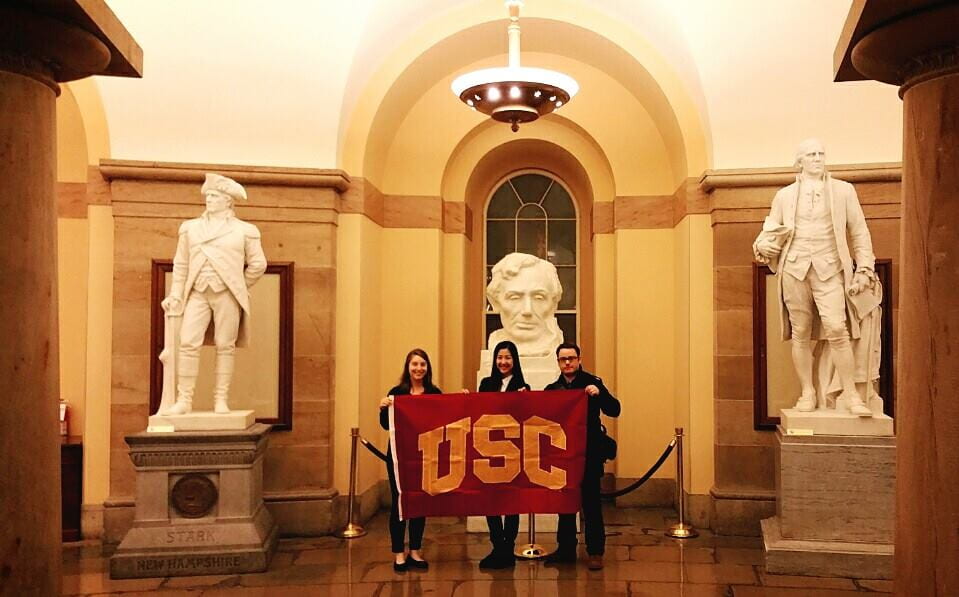
Following the Capitol tour, the MPD/CCLP delegation met with Congressman Schiff in his office in the Rayburn House Office Building. They discussed his role on the House Select Committee on the Benghazi Attacks, the importance of diplomacy in strengthening the U.S.’s national security, the controversial issue of “comfort women” between Japan and South Korea, and Schiff’s Freedom of Speech Caucus.
“We don’t have much to show for the $6 million we spent [on this latest Benghazi investigative committee],” said Schiff. “It was largely a fishing expedition [with political goals].”
Schiff also noted that diplomacy is “absolutely essential” to strengthening the U.S.’s national security. “For some years there was some level of disdain for diplomacy efforts, but people have recognized that there are real limits to even the most powerful military in the world. So some of the steam has gone out of the school of thought that diminished the value of diplomacy.”

As soon as the meeting with Congressman Schiff was over, a large buzzer in his office indicated that it was time for him to rush through the underground tunnels to the House floor to cast his vote on an energy bill. Meanwhile, the MPD delegation traveled to the other side of the city to meet with representatives of the John F. Kennedy Center for the Performing Arts, Madeleine McGill and Sarah Kyrouac. They discussed their role in working with foreign embassies to develop international programming.
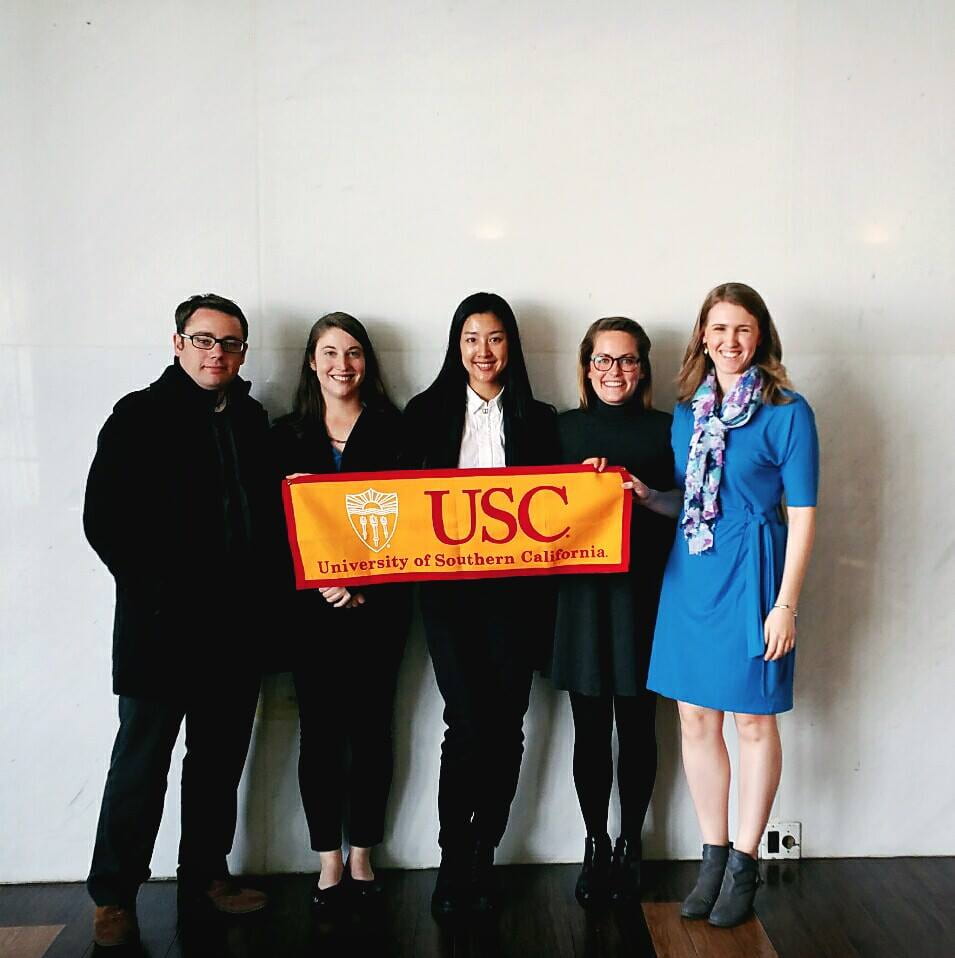
The next day, the MPD/CCLP delegation had several meetings at the State Department.
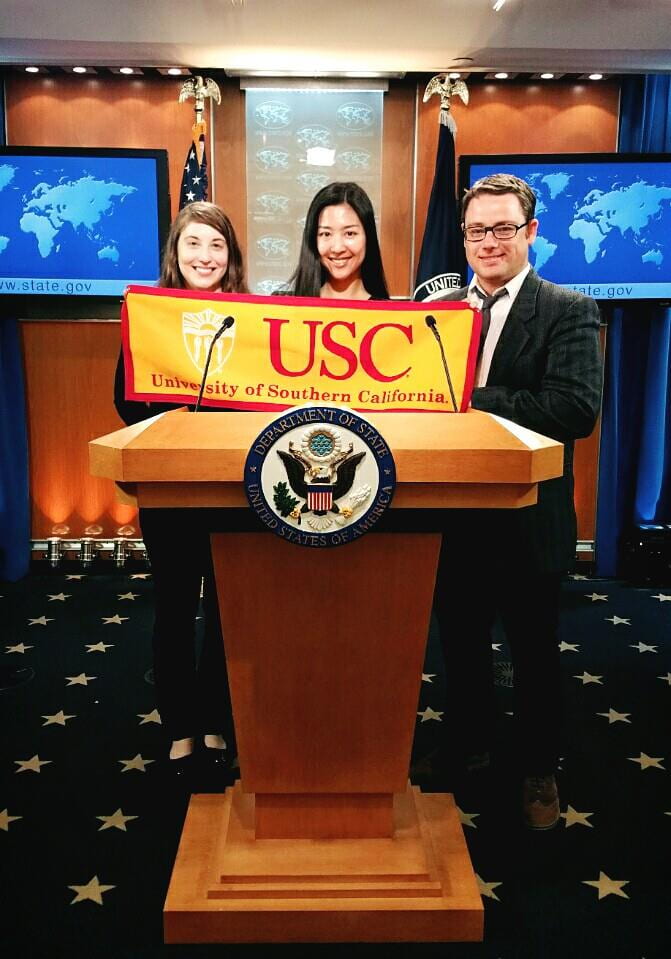
At the State Department, we met first with Judith Snyderman and Lindsey Spector from the Bureau of International Information Programs (IIP), as well as a student group from Syracuse University, with whom we discussed the increasing use of social media and other digital tools for global engagement.
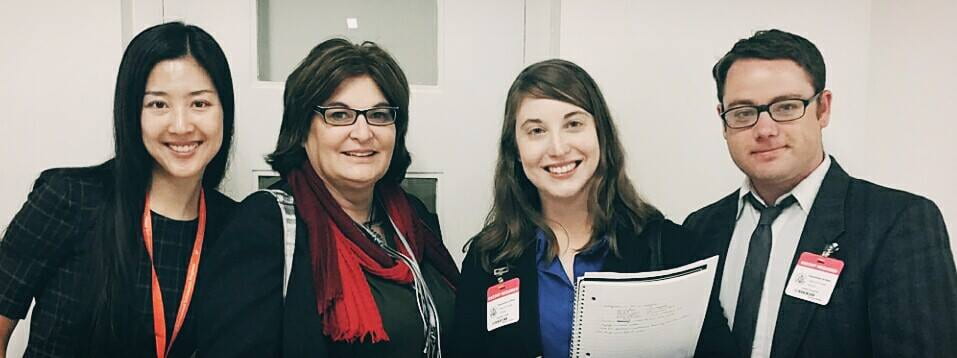
Next, we met with Mark Taplin, Deputy Assistant Secretary for Policy at the Bureau of Educational and Cultural Affairs (ECA), and Alyson Grunder, Director of the Office of Policy and Evaluation at ECA. Taplin and Grunder talked with the MPD/CCLP delegation about what has and has not changed in ECA over the past twenty years and answered questions on evaluation, alumni management, and the relationship between ECA programs and foreign policy objectives.

Afterwards, we met with Robert Hilton, Director of Press and Public Diplomacy in the Bureau of Near Eastern Affairs (NEA), and Caroline Nohr, an MPD alumna and Country Coordinator for Australia, New Zealand, & the Pacific Islands in the Bureau of East Asian and Pacific Affairs (EAP). Discussion focused on programming strategies and sensitivities in these regions, the Obama administration’s “rebalance” towards the Asia Pacific region and its effect on public diplomacy, and the importance of giving public diplomacy specialists input into policymaking and policy implementation.

For lunch we met with a few MPD alumni who work at the State Department. Melanie Ciolek is a Policy Officer with IBB. Martha Adams is a Public Affairs Specialist in the Office of Strategic Planning in the Bureau of Public Affairs (PA). Henrietta Levin is a Presidential Management Fellow with the Office of the Secretary of Defense, currently detailed to the State Department. These alumni shared work experiences and helpful advice on careers and internships.
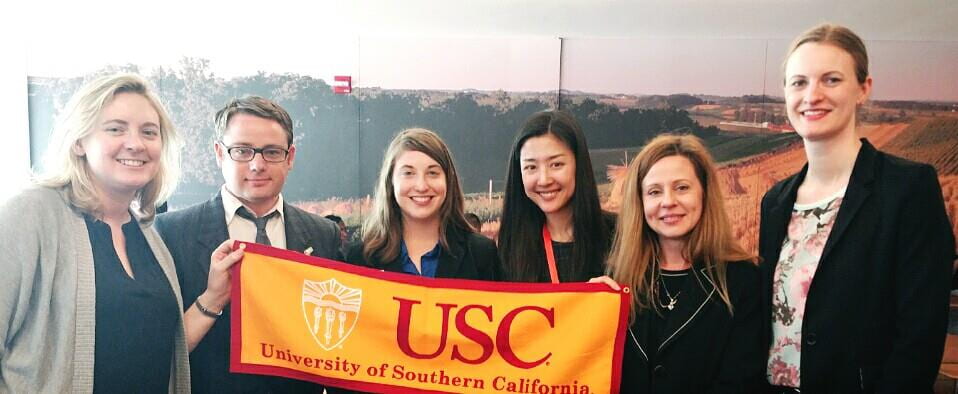
In the afternoon, we attended a Press Briefing at the State Department. After a preliminary statement about the Obama administration missing a congressional deadline on responding to ISIS atrocities; condemning the bombing of a mosque in Nigeria by Boko Haram; and strongly suggesting Americans restrict all travel to North Korea after that island nation sentenced 21-year-old U.S. citizen Otto Warmbier to 15 years hard labor for stealing a banner from a hotel, Deputy Spokesperson Mark Toner fielded questions from the press on the possibility of the U.S. recognizing the violence against religious and ethnic minorities in Syria by the Islamic State as genocide, the Russian exit from Syria, press freedom in Turkey, and other current issues.

After the Press Briefing, we met with Xander Vagg, Foreign Affairs Officer at the U.S. Diplomacy Center, which is a museum and educational center for American diplomacy scheduled to open in late 2017 or early 2018 that will include several interactive exhibits.
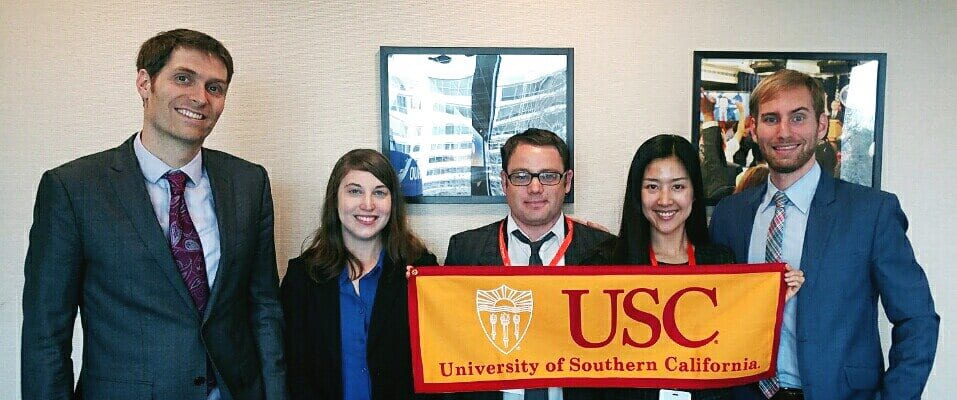
The meetings at the State Department were made possible by Elena Kovalchuk, Sanaa Anwar, and James Dewey.
Following the State Department visit, we met with Capricia Marshall, Ambassador-in-Residence with the Adrienne Arsht Latin America Center at the Atlantic Council, a think tank that brings together leaders in international politics, business, and academia to study security and economic issues. Previously, she was Chief of Protocol of the United States, Special Assistant to Hillary Rodham Clinton during Bill Clinton’s presidential campaign in 1992, Special Assistant to the First Lady, and White House Social Secretary during the Clinton administration.

Ambassador Marshall and the MPD/CCLP delegation discussed her career in public service, programs she started involving ambassadors and gastrodiplomacy, careers at think tanks, the economic and security benefits of investing in programs that promote mutual understanding, and maintaining a work-life balance.
The last meeting I attended was at the United Nations Information Center. We met with the deputy director of the Center, Andi Gitow. After discussing the Center’s role, which is to serve as a focal point and resource for UN news and information so as to advance understanding about the UN and its work, Gitow answered our questions about harnessing the power of videos and storytelling for advocacy and the UN’s current efforts to engage with young people.
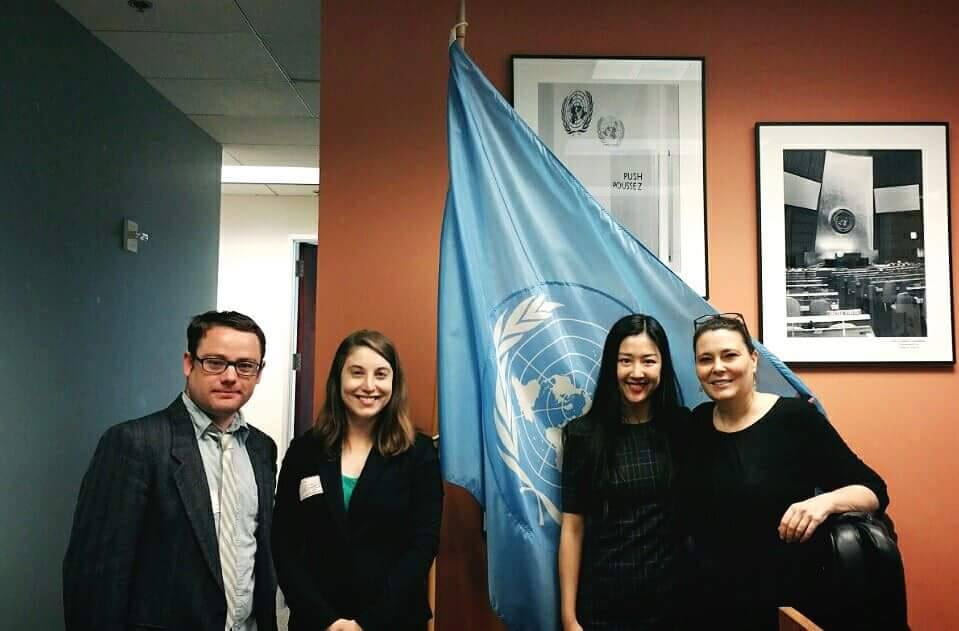
Following the meeting at the UN, Lester and Kang took a tour of the White House while I visited Ford’s Theater, where President Abraham Lincoln was assassinated.

After I left for the airport (where I ran into House Speaker Paul Ryan), Lester and Kang met with Arman Sapargaliyev, Second Secretary (Energy) in Economic Affairs at the Embassy of the Republic of Kazakhstan. Their discussion centered on Sapargaliyev’s role in attracting American corporate sponsors for the 2017 Astana Expo, whose theme is “Future Energy.” This three-month long international mega-event will bring together millions of people to raise awareness of and encourage sharing and collaboration on global energy issues. Next, they visited the Korean Cultural Center in DC, where they met with Adam Wojciechowicz, staff member at the Embassy of the Republic of Korea. Currently under renovation, the Korean Cultural Center offers art exhibits, language classes, and events for the American public to learn about South Korea. Then they met with Global Ties US president Jennifer Clinton and Franziska Rook, Program Manager of Membership. This organization is a non-profit partner of the U.S. Department of State, managing a domestic network which supports international exchange programs, including the International Visitor Leadership Program, of which more than 335 current or former heads of state are alumni. Clinton and Rook also talked about some new programs that Global Ties US actually runs and the importance of building evaluation tools into programs from the very beginning. On their last day, Lester and Kang met with Paul Smith of the British Council and Roger Launius of the National Air and Space Museum.



